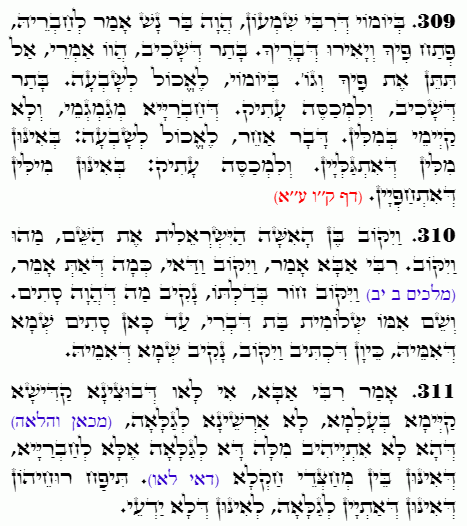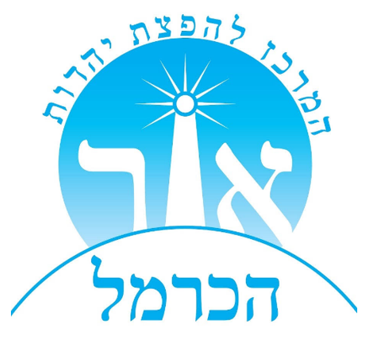Daily Zohar # 4575 – Emor – She talked too much
Daily Zohar 4575

Hebrew translation:
310. וַיִּקֹּב בֶּן הָאִשָּׁה הַיִּשְׂרְאֵלִית אֶת הַשֵּׁם. מַה זֶּה וַיִּקֹּב? רַבִּי אַבָּא אָמַר, וַיִּקֹּב וַדַּאי, כְּמוֹ שֶׁנֶּאֱמַר (מלכים-א יב) וַיִּקֹּב חֹר בְּדַלְתּוֹ, נָקַב אֶת מַה שֶּׁהָיָה סָתוּם. וְשֵׁם אִמּוֹ שְׁלֹמִית בַּת דִּבְרִי, עַד כָּאן נִסְתַּר הַשֵּׁם שֶׁל אִמּוֹ. כֵּיוָן שֶׁכָּתוּב וַיִּקֹּב, נָקַב אֶת שֵׁם אִמּוֹ.
311. אָמַר רַבִּי אַבָּא, אִם לֹא שֶׁהַמְּנוֹרָה הַקְּדוֹשָׁה עוֹמֵד בָּעוֹלָם, לֹא הֻרְשֵׁינוּ לְגַלּוֹת, (מִכָּאן וָהָלְאָה) שֶׁהֲרֵי לֹא נִתָּן דָּבָר זֶה לְגִלּוּי אֶלָּא לַחֲבֵרִים, שֶׁהֵם בֵּין קוֹצְרֵי הַשָּׂדֶה. (שֶׁאִם לָאו) תִּפַּח רוּחָם שֶׁל אֵלּוּ שֶׁבָּאִים לְגַלּוֹת לְאוֹתָם שֶׁלֹּא יוֹדְעִים.
.
Zohar Emor
Continued from previous DZ
#309
During the days of Rabbi Shimon bar Yochai, one would say to another, “Open your mouth, and your words will illuminate.” After he passed away, they would say, “Do not let your mouth lead you to sin.” In his days, to “eat to satiety,” but after he passed, to “cover the Ancient One,” as the friends stuttered and did not have clarity in their words. Another interpretation: “To eat to satiety” refers to studies that are revealed in the Torah. And “to cover the Ancient One” refers to secrets that are concealed in the Torah.
#310
Leviticus 24:11
“וַיִּקֹּב בֶּן הָאִשָּׁה הַיִּשְׂרְאֵלִית אֶת הַשֵּׁם וַיְקַלֵּל וַיָּבִיאוּ אֹתוֹ אֶל מֹשֶׁה וְשֵׁם אִמּוֹ שְׁלֹמִית בַּת דִּבְרִי לְמַטֵּה דָן.”
“And the Israelite woman’s son (וַיִּקֹּב) blasphemed the name of the LORD and cursed, and so they brought him to Moses. His mother’s name was Shelomith, the daughter of Divri and of the tribe of Dan.”
The question arises: What does “ויקוב” mean? Rabbi Abba said, “ויקוב Indeed, it means that he made a hole in his door, pierced what was sealed. It is similar to making a hole. His mother’s name was Shelomith, daughter of Divri. Until this point, the scripture concealed his mother’s name, but once it says, “ויקוב” (pierces through to disclose), it reveals his mother’s name.
#311
Rabbi Abba said, “If it were not for the holy luminary, who is Rabbi Shimon, being alive in the world, I would not permit myself to reveal, for such a matter was only given to be revealed to the friends who are among the ‘harvesters of the field,’ meaning those who have already entered into the wisdom of the hidden and have come out of it safely. May the spirit be blasted (תִּפַּח רוּחָם, ‘drop dead’) of those who come to reveal it to those who do not know.”
Lesson;
This Zohar reflects the profound impact of Rabbi Shimon on the dissemination and discussion of the secrets of the Torah. During his lifetime, the flow of deep kabbalistic knowledge was encouraged and flourished among his students, symbolized by the phrase “פְּתַח פִּיךָ וְיָאִירוּ דְבָרֶיךָ” “Open your mouth and your words will illuminate. (https://www.sefaria.org/Berakhot.22a.8?lang=bi)” This indicates a time of great enlightenment where the secrets of the Torah were more openly discussed and understood. However, after Rabbi Shimon’s death, the situation changed. The phrase “Do not let your mouth lead you to sin” suggests a more cautious approach to discussing Torah secrets, likely due to the lesser capability or preparedness of the succeeding generations to fully grasp or appropriately handle these profound teachings. This shift from “eating to satiety” to “covering the Ancient One” marks a transition from an era of revelation to one of concealment, reflecting a need to protect the more profound wisdom from potential misuse or misunderstanding. We know that the Zohar was concealed for over a thousand years.
The terms “revealed” and “concealed” correspond to the different layers of Torah understanding: the revealed, which is more openly discussed and accessible, and the secrets, which are kept hidden and only shared among the worthy or initiated. This balance between revelation and concealment is crucial in maintaining the integrity and sanctity of secrets.
-=-
This discussion relates to the son of an Israeli woman and an Egyptian man who blasphemed the Name of God and cursed, as described in Leviticus 24:10-23. The term “ויקוב” is interpreted by Rabbi Abba to mean creating a breach or a hole in what was previously concealed — in this context, the identity of his mother, Shelomith. Typically, the Torah shields the names of individuals associated with sins, but in this instance, it discloses that his mother was involved with an Egyptian. This act is seen as revealing the ‘secret’ of the holy vessel to the Egyptians, and consequently, her son was impure. Her name suggests that she was ‘nice’ to people, often greeting everyone with ‘Shalom’ (hence Shelomith); her father was Divri, derived from the word “דיבור” (“speaking”). Engaging in dialogue with those who are not on the holy side can lead to sins.
The term “harvesters of the field” metaphorically describes those who toil in the field, which is Malchut, study the Torah, and know how to bring out its ‘fruits,’ which are the secrets that are concealed in it without harm.
Rabbi Abba’s caution against revealing these secrets to the uninitiated reflects a recurring theme in the study of secrets, Kabbalah: the potential dangers of imparting profound spiritual knowledge to those who are not prepared or deemed worthy. This is not only to protect the sanctity of the knowledge but also to guard against misinterpretation and misuse, which can lead to spiritual harm for both the teacher and the student. The phrase “may the spirit be blasted” is a strong rebuke or curse against those who irresponsibly or inappropriately disclose sacred wisdom, emphasizing the severe consequences of such actions.
Friday would be a good day to make a ** Donation, especially if you didn’t donate in the past week. Giving on Friday, which is an aspect of Yessod, expands the vessel for the Light and honor of Shabbat.
** Your donation doesn’t have to be given to the same place every week. You can alternate or split your donation among those who benefit you spiritually.
 Support – Ohr HaCarmel Yeshiva
Support – Ohr HaCarmel Yeshiva
Tap here: Ohr HaCarmel Donation Page to make your contribution and make a spiritual connection to Israel.
The Yeshiva Ohr HaCarmel (which means the Light of the Carmel) is on top of Mount Carmel, where the prophet Elijah’s prayers were answered.

 Previous: Emor
Previous: Emor

